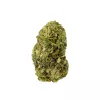Limonene, a prominent terpene found in various plants including cannabis, has gained attention for its potential health benefits and unique characteristics.
Let’s delve into the frequently asked questions about limonene, its properties, effects, and applications. From its molecular structure to its impact on our well-being, we'll uncover the essential aspects of this intriguing compound.
What is the Limonene Terpene?
Imagine walking through a sun-dappled orchard, surrounded by rows of citrus trees laden with ripe fruits. That refreshing scent that fills the air – that's limonene.
A cyclic terpene with a unique structure resembling a bicycle wheel, limonene is a versatile compound found in the essential oils of many plants, particularly in citrus fruits.
The limonene molecule contains two reactive double bonds that give it antioxidant properties and make it energetically favorable for biosynthetic modifications. This distinctive limonene structure allows it to interact with cellular proteins and enzymes, enabling its array of therapeutic effects.
Oranges, lemons, grapefruits – they all owe their invigorating aroma to limonene. As you dive into a juicy orange, the burst of citrusy goodness that awakens your senses is the work of limonene. And when you savor that tangy lemon-flavored dish, you're indulging in the magic of this charming terpene.

What is D-Limonene?
D-limonene is a compound that occurs naturally in citrus fruits like oranges, lemons, limes, and grapefruit. It is what gives these fruits their fresh, citrusy aroma and flavor. D-limonene belongs to a class of compounds called terpenes that are produced by many plants. It is extracted from citrus peels through a steam distillation process to concentrate the d-limonene.
The “D” in d-limonene refers to its molecular structure. Limonene can exist in two forms, called isomers, that are mirror images of each other - d-limonene and l-limonene. D-limonene is the more common natural form, making up over 90% of limonene derived from citrus. It is used widely as a fragrance in cosmetics, cleaning products, and foods to provide a bright, orange-like smell.
In addition to its pleasant scent, d-limonene has been shown to have antioxidant, anti-inflammatory, anti-fungal, and antimicrobial properties. Research indicates it may offer certain health benefits, like aiding in weight loss and digestion, reducing heartburn, relieving anxiety, and fighting cancer. However, more clinical studies are needed to confirm these potential medicinal uses for d-limonene.
What Does the Limonene Terpene Do?
Limonene has antioxidant, anti-inflammatory, anticancer, antimicrobial, and cholesterol-lowering properties. It helps relieve anxiety and stress, boost immunity, increase metabolism, and detoxify the body. Limonene also enhances the absorption and effects of other terpenes and cannabinoids. Its citrusy aroma makes it a popular additive in cosmetics, cleaning products, and food.

Which Cannabis Strains Contain the Most Limonene?
The presence of limonene in cannabis is believed to contribute to its aromatic profile and could potentially offer various therapeutic benefits. Below is a list of cannabis strains renowned for their limonene content, showcasing the diversity of options available to those who appreciate its distinct aroma and potential effects.
| Strain Name | Type | Limonene Content | Aroma and Effects |
|---|---|---|---|
| Lemon Haze | Sativa | High | Zesty, lemon-citrus aroma; uplifting and energetic effects. |
| Super Lemon OG | Hybrid | High | Strong lemon scent with hints of pine; balanced effects that combine relaxation and mental clarity. |
| Sour Diesel | Sativa | Medium to High | Diesel-like aroma with citrus undertones; energizing and euphoric effects. |
| Lemon Skunk | Hybrid | Medium to High | Skunky and lemony scent; uplifting, creative, and sociable effects. |
| Lemon Kush | Hybrid | Medium | Sweet lemon fragrance; relaxing and soothing effects with potential euphoria. |
| Lemon G | Hybrid | High | Intense lemon aroma; balanced effects known for promoting relaxation and happiness. |
| Lemon Meringue | Sativa | Medium | Sweet lemon pie aroma; mood-enhancing and cerebral effects. |
| Lemon Diesel | Hybrid | Medium | Tangy lemon fragrance; provides a mix of mental clarity and gentle relaxation. |
| Lemon Berry | Indica | Medium | Berry and lemon blend in aroma; relaxing and potentially sedating effects. |
| Lemonade | Hybrid | Medium to High | Refreshing lemon scent; reported as promoting relaxation and euphoria. |
Limonene’s Role and Effects
Alright, let's get into the nitty-gritty of what limonene does. Besides being a natural solvent – think of it as the easygoing mediator in the world of molecules – limonene has a knack for enhancing fragrances. So, when you take a whiff of that sweet, tangy scent in your skincare products or cleaning supplies, chances are limonene is in the mix.
But here's the really cool part. Limonene may have some magical mood-boosting and stress-relieving abilities. Some people swear by its calming effects, saying it's like a little zen master that eases worries away. And if that wasn't enough, limonene also has potential anti-inflammatory skills. It's nature's way of saying, "Hey, take it easy, everything's alright."
The Limonene Terpene in Cannabis
Alright, so let's zoom in on limonene's connection to the world of cannabis. Yep, it's not just about oranges anymore. Limonene isn't shy about showing up in various cannabis strains, and it's like a VIP guest at a party – you can't miss it. When you take a deep inhale of a limonene-rich strain, you're instantly greeted with that familiar citrusy aroma. It's like sipping on a cool lemonade on a hot summer day – refreshing and invigorating.
But there's more to limonene than its scent. Some cannabis strains with high limonene content might offer you a sense of calm and tranquility. Feeling the tension of the day? Limonene might just be the natural soother you need. It's like a gentle breeze that carries your worries away.
And wait for it... there's more. Some cannabis strains with high limonene content might offer you a little mood makeover. Feeling a bit down? Limonene could be the friendly hand that lifts your spirits. Got some inflammation causing trouble? Limonene might just be the natural remedy you've been looking for.
For cannabis lovers, limonene is the unsung hero supporting the entourage effect. That's when all the compounds in cannabis harmonize to create a symphony of effects. Limonene adds a bright high note to the mix, enhancing the overall experience.
The entourage effect is like a band where each instrument brings a unique sound that comes together into a melodic masterpiece. In cannabis, limonene terpene adds its citrusy flair to create well-rounded therapeutic effects. Pretty cool, huh?
Now, let's talk a bit about limonene’s effects:
-
Creates an energizing, uplifting effect
-
Enhances absorption of other terpenes and cannabinoids
-
Increases energy and improves mood
-
Has anti-anxiety and stress-relieving properties

What is the Limonene Terpene in Weed?
Limonene is one of the most abundant terpenes found in weed. It gives certain strains a bright, zesty citrus flavor and aroma. Limonene provides uplifting, stress-relieving effects and can enhance the absorption of THC and other cannabinoids.
It interacts with the endocannabinoid system to reduce anxiety, elevate mood, and relieve pain. Limonene is found in higher concentrations in Sativa strains.
Is Limonene Polar or Non-polar?
Because limonene is a hydrocarbon, it’s also non-polar. If you need a little refresher in chemistry, this means that limonene has no separation of charge, meaning that no positive or negative poles are formed. In other words, its electrical charges are evenly distributed across the molecule.
Now, the non-polarity of limonene matters because it affects how it interacts with other compounds. Limonene’s non-polarity allows it to interact with cannabinoids like THC, CBC, CBD, and CBG, as well as function with other terpenes such as linalool and caryophyllene, making way for the entourage effect, where compounds work together to create a more well-rounded experience.
Is the Limonene Terpene Safe?
We're all about those good vibes and smooth experiences, and when it comes to our favorite plant, safety is a big deal. So, let's kick back, grab our herbal goodies, and dive into the safety of limonene – that citrusy terpene that adds a touch of sunshine to our highs.
You might be wondering – is limonene really safe to consume? Well, let's put those worries to rest. Limonene has earned its badge of honor as a Generally Recognized as Safe (GRAS) compound by the FDA. It's like your favorite snack getting the green light from the ultimate food referee.
But, hey, just like anything else, even the sunniest substances can have their off days. Some folks might have a sensitive side when it comes to limonene, experiencing mild allergic reactions or sensitivities. As with anything, it's a good idea to listen to your body and approach new experiences with caution.

Health Benefits of D-Limonene
Picture this: you're enjoying a hearty meal, and suddenly, your stomach does a somersault. Enter d-limonene, the digestion superhero. This natural compound does a little dance with your stomach juices, promoting a smoother digestive process. It's like giving your tummy a friendly pat on the back and saying, "Hey, take it easy."
But hold up, because the story doesn't end there. Let's dive a bit deeper into how d-limonene can be your ally in maintaining that inner harmony. You know that feeling when your stomach seems to be staging a revolt after a particularly indulgent meal?
D-limonene might just be the soothing voice that calms the riot. By helping your stomach juices flow more smoothly, it prevents that uncomfortable reflux that can turn a satisfying meal into a regretful memory.
How To Take D-Limonene for Acid Reflux
D-limonene supplements can provide relief from occasional acid reflux and heartburn. Derived from citrus peels, d-limonene assists digestion by aiding stomach acid flow.
To use d-limonene for acid reflux:
-
Take 500-1000mg capsules containing pure d-limonene. Start with lower doses.
-
Take 1-2 capsules 20-30 minutes before meals. This allows d-limonene to start working before you eat.
-
Taking with food boosts its effects on digestion and reflux.
-
Follow label directions and talk to your doctor before starting.
-
D-limonene taken regularly may reduce the frequency of acid reflux episodes.
Moderation is key - work with a healthcare practitioner to find the right d-limonene dosage for your needs. With proper use, d-limonene's citrusy flavor can help maintain digestive balance.
Now, how can you make the most of D-limonene's talents? Well, it's available in supplement form, typically as orange oil capsules. Pop one of these capsules about 20 minutes before a meal, and let the magic happen. But remember, folks, moderation is key. Consult with your healthcare pro before embarking on a d-limonene journey, just to make sure it's a smooth ride for you.
Limonene and Mental Well-Being
Alright, let's clear the air about limonene and its effects on your mental state. Does it send anxiety packing or just add fuel to the fire?
It’s actually the opposite! Limonene is like that cool, calm friend who helps you breeze through stressful situations. Studies have hinted at its potential to reduce stress and improve your overall mood, making you feel like you're catching rays of sunshine even on the cloudiest days.
Now, don't just take our word for it. Science and personal experiences are joining hands here. Some studies have shown limonene's mood-enhancing abilities, while countless individuals swear by its soothing effects.
Does Limonene Cause Anxiety?
Research shows limonene has anti-anxiety and stress-relieving properties. Limonene is known for its calming, uplifting effects. Studies have found-limonene increases levels of serotonin and dopamine in the brain, two key neurotransmitters involved in regulating mood and emotions. The citrusy aroma of limonene may also trigger relaxation.
Sensory Experience: How Does Limonene Make You Feel
Ah, the sensory symphony of limonene – let's dive into that. Imagine inhaling the zesty aroma of a freshly peeled orange. Now take that feeling and multiply it by ten.
That's the kind of sensory experience limonene brings to the table. Its citrusy fragrance is like a hug for your senses, awakening a feeling of freshness and energy.
But it's not just about the smell. Limonene's potential effects can also contribute to your overall sense of well-being. Whether you're using it to set the mood, ease stress, or simply enjoy its delightful aroma, limonene is like a little bottle of happiness.
How Many Hydrogens Are in Limonene?
Alright, time to get a bit nerdy with limonene's molecular makeup. D-limonene has got a total of 16 hydrogen atoms kicking back in its molecular structure. But what’s so important about this?
Here's the scoop: these hydrogen atoms are the secret sauce behind-limonene's easygoing nature. They're like the social butterflies of the compound world, making limonene a true team player. This relaxed vibe contributes to its versatility, allowing limonene to harmoniously mingle with other compounds.
Think of it as that cool cat who effortlessly fits into any group – a trait that makes limonene a star player in the world of cannabis. So, the next time you enjoy a strain rich in limonene, just remember – you're savoring the essence of a true party diplomat.

Handling and Toxicity
Just like you wouldn't down a gallon of orange juice in one go, moderation with limonene is key. Too much limonene might cause some stomach discomfort, so it's best to stick to recommended dosages.
As with any natural compound, it's always a good idea to have a chat with your healthcare provider before diving headfirst into a limonene adventure.
Is Limonene Toxic?
The good news is that limonene is of relatively low acute toxicity when taken orally, meaning it’s generally safe for most folks when used as intended!
Is Limonene Flammable?
Limonene is considered flammable, so it's a good idea to keep it away from open flames and high heat.
Wrapping Things Up
Limonene, a remarkable terpene found in a variety of plants, holds immense potential for both physical and mental well-being. From its aromatic allure to its potential health benefits, limonene continues to captivate researchers, enthusiasts, and those seeking natural remedies.
As scientific exploration progresses, a clearer understanding of limonene's effects and applications is emerging, shedding light on the countless possibilities this terpene offers.











